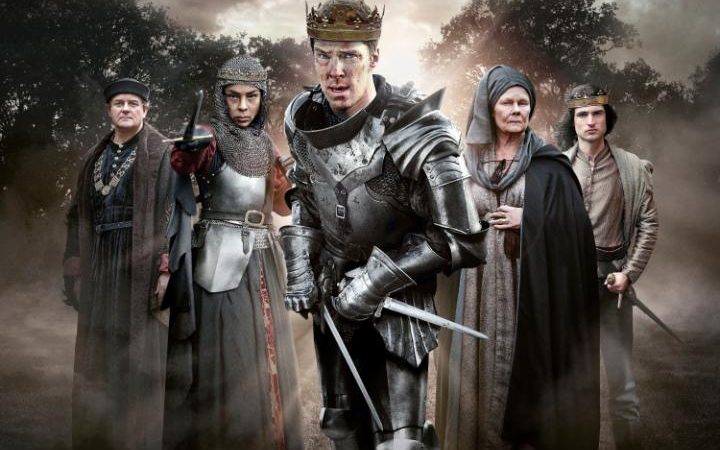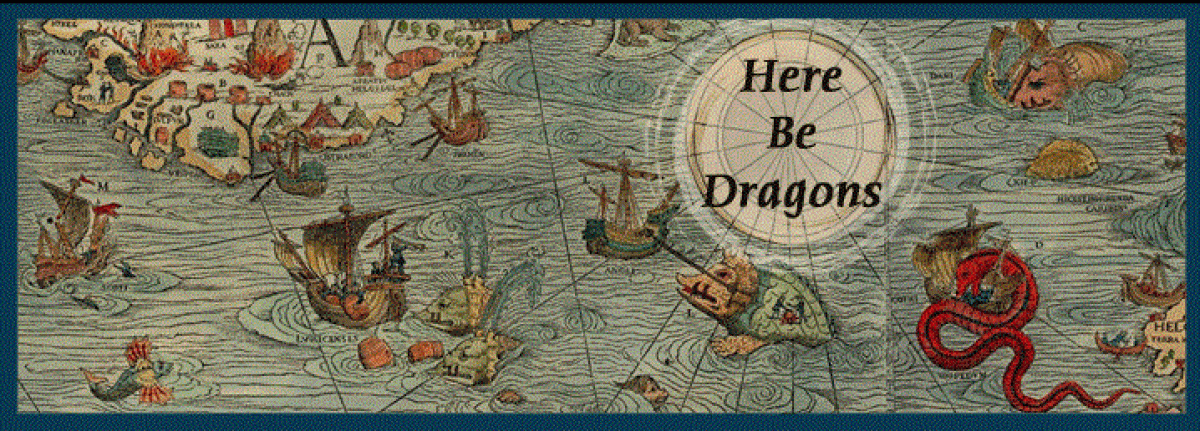
If you live in the U.K. I bet you are well aware that the award winning series “The Hollow Crown” part 2 The War of the Roses” is being telecast right about now. If you are not aware this may help explain why all of the young girls are giggling and staying home; Benedict Cumberbatch is playing Ricard III.
This production is a series of some of Shakespeare’s English history plays. In chronological order of setting, these are: Richard II, Henry IV Parts I and II, Henry V, Henry VI Parts I, II and III, Richard III. But if we look at the order of when they were written we see that Shakespeare may not have had a series in mind.
Henry VI part II 1590
Henry VI part III 1590
Henry VI part I 1591
Richard III 1592
Richard II 1595
Henry IV part I 1597
Henry IV part II 1597
Henry V 1598
Looking at the order above, we may wonder just what it was Shakespeare had in mind. But if we keep in mind that his primary focus was the stage, not history, we can guess that for Shakespeare the story was thing. Knowing that Henry VI part II was written first it seems to me (and this is just an educated guess) that Shakespeare wrote the plays in response to current events or in order that he found the subject matter fascinating, maybe a little of both.
Thankfully for modern audiences the plays are presented in chronological order. I say thankfully because at times they can be hard to follow, especially the Henry VI plays. I cannot imagine trying to piece the narrative together if I had to watch them in order that they were written. But to be completely honest for many Americans Shakespeare’s history plays are hard to follow no matter the order. Here’s the rub; as much as we may adore Shakespeare’s work, his history is not our history. We don’t study English history unless we seek it out in college or become armchair historians. Many of the characters and events depicted in the history plays are all we have to go on. For many these plays represent our first window view into medieval England. But the window is cloudy and at times we are unsure of what we are seeing.
I was an armchair historian before I went back to school. I fell in love with the medieval Europe and as an undergrad studied the period in which the Catholic Church became the center of politics. Even so, I had questions the first time I saw Richard II. Why was he so hated? Why was it so easy for Henry Bolingbroke to take the crown? Who were all the players in the Henry VI series and more importantly, was Shakespeare true to history?
Now with renewed interest in the Hollow Crown series, I decided it was time to do some reading.

1999
I’ve had John Julius Norwich’s book “Shakespeare’s Kings” on my bookshelf for about a year. I picked it up last week in the hopes that it would answer some of my questions and further my education on medieval kings. I wish I had read it earlier.
Norwich’s book could easily be a guide to the Hollow Crown series. Norwich begins his book not with Richard II but with Edward III, a play that some earlier scholars argued that Shakespeare helped write. Today’s scholars are slowly coming to the same conclusion, though I remain unconvinced. The prose seems sloppy and lacking in depth. Yet the inclusion of Edward assists Norwich as he attempts to paint on a broad canvass. Edward is the jumping off point to Richard’s reign as King and helps explain why it is Richard was such a disappointment.
Norwich is a fine narrator. His retelling of history is engaging and informative. As a historian he does not fall into the easy trap of extrapolating facts to fit his idea of history or seeks to understand it in modern context. I was sucked into the each King’s story and never once questioned Norwich’s conclusions (he has none) or questioned his motive. This is a clean narrative and a history book that is exactly what it claims to be; a historical look at some of Shakespeare’s kings. It is rare to find such a book now days.
Norwich lays out the historical events that shape each play, one by one. Each King is then subjected to Norwich’s summary of the play in question. He breaks them down act-by-act, pointing out inaccuracies and complete fabrication. Like he does with his narrative, Norwich does not judge Shakespeare or act as his chief apologist. Instead, Norwich reminds us that Shakespeare’s focus was on story telling, not lecturing his audience on historical facts. Along the way Norwich explains what source material Shakespeare probably used (I say probably because there was so little to choose from) and how the material shaped his view of Henry V and Richard III.
Reading Norwich’s account of Henry VI’s reign and how it led to the war of the Roses I began to understand why Shakespeare decided to pen three plays on this hapless King. But even so, I was a little disappointed on the liberties Shakespeare takes with historical fact. But then again, I had to remind myself that the more educated of his audience would have had a good understanding of history and would forgive him in order to be entertained. The less educated probably wouldn’t have cared.
Norwich begins with Edward III and ends with Richard III, which encompasses the years 1337 to 1485. This is a lot to take in, so I wouldn’t be at all surprised to find that the book requires a second reading or acts as a reference guide to specific plays. It certainly will remain in arms reach for me as I eagerly await the American premier of The War of the Roses.

I watched the first series beginning with Richard II but have recorded the current series to watch when time suits. I also have vague memories of an earlier BBC Hollow Crown series in the 70s or 80s with, I think, Ian Holm as Richard III, but I’ll have to research that to confirm if my mind is playing me tricks or not! You mention armchair scholars, it’s miraculous too to be an armchair theatre-goer.
Hope you get to see these soon!
LikeLiked by 2 people
It certainly does feel magical when we can sit in the comfort of our own home and watch any play we want. Sadly though, we have to wait until the fall to see series two.
LikeLike
Making it even more complicated is that there are various interpretations of the politics of the War of the Roses. Dynastic conflict? A struggle between rival noble factions? A byproduct of the economic and sociological changes taking place in England at the time? A reflection of changing means of making war? Or do we take Alison Weir’s account of Katherine Swynford to heart and say it didn’t matter, because the royal family, no matter which branch, would ultimately be descended from John of Gaunt’s mistress?!
When I was in high school, there was a popular war game called “Kingmaker,” which was meant to simulate the War of the Roses as a conflict of warring noble factions in which the members of the royal families were passive pawns. Quite a different perspective from Shakespeare. I learned a fair bit of English geography playing that game! Sadly, it is out of print.
LikeLiked by 1 person
Wow, that does sound like a fantastic way to learn. When I was high school our American history teacher tried something new. His assistance came up with a Civil War game. We learned the politics and strategies of both sides. I was General Lee and ended up winning the war by getting England to help the South; I promised to end slavery, but did not specify when. LOL, my teacher wasn’t sure how to feel about my victory.
As for the War of the Roses, I think there are many many reasons for the ongoing conflict, but underpinning them all is the fact that there were too many royals who wanted it all and felt their connection to Gaunt would allow them to have it. I don’t take this book to heart, and even the author says he is giving a brief history, but I have a better idea of who many of the players are. It does give a good intro to Richard II. It’s worth the read for that alone.
LikeLiked by 1 person
The way you put it, too many entitled nobles, sounds quite similar to the problem Scotland had in 1290. Robert the Bruce was just one of 14 Contenders for the throne vacated by the quick deaths of Alexander III and his granddaughter Margaret.
LikeLiked by 1 person
And sounds like the 17 republican contender we saw earlier in the year 🙂
LikeLiked by 1 person
Except they didn’t marry each other’s daughters. 🙂
LikeLiked by 1 person
Reblogged this on Wyrdwend.
LikeLiked by 1 person
Thanks Jack!
LikeLiked by 1 person
So much to comment on here, not least of which is B Cumberbatch as Richard III. I’m trying to picture it, but with little luck. Tom Hiddleston as Prince Hal and Henry V keeps intruding.
I just recently read Desmond Seward’s history of the Plantagenet line, which starts earlier than Norwich’s book. I’ll look for Norwich, for Seward’s was too sprawling, with so many dukes and earls and princes, all named Richard or Edward (including the French ones), that I couldn’t keep them straight. I’ve also read Anya Seton’s bio-novel about Katherine Swynford, which provides a good look at Richard II’s challenges. But I’ll never forget, no never, seeing Ian Richardson as Richard II in London in 1974. Heartbreaking. Because of that performance, I’ll always feel sympathy for the boy king.
But re Shakespeare’s loose-play with historical fact: don’t forget his historical context. To what extent was he working with (or against) Elizabeth I’s and James VI/I’s political leanings? To what extent was he couching criticism of royal power in studies of pre-Tudor kings?
LikeLiked by 1 person
As an American, the War of the Roses had always been a muddle in my mind. The Hollow Crown series of plays and another series “The White Queen” based on Philippa Gregory’s novels was a both entertaining and educational. I am planning on re-seeing all of them again. One of the things the Hollow Crown does do is it treats the plays in their historical context. So two thumbs up for both series.
LikeLiked by 1 person
John Julius Norwich IS a great read, and I’ve found it invaluable in my own read-through.
LikeLike